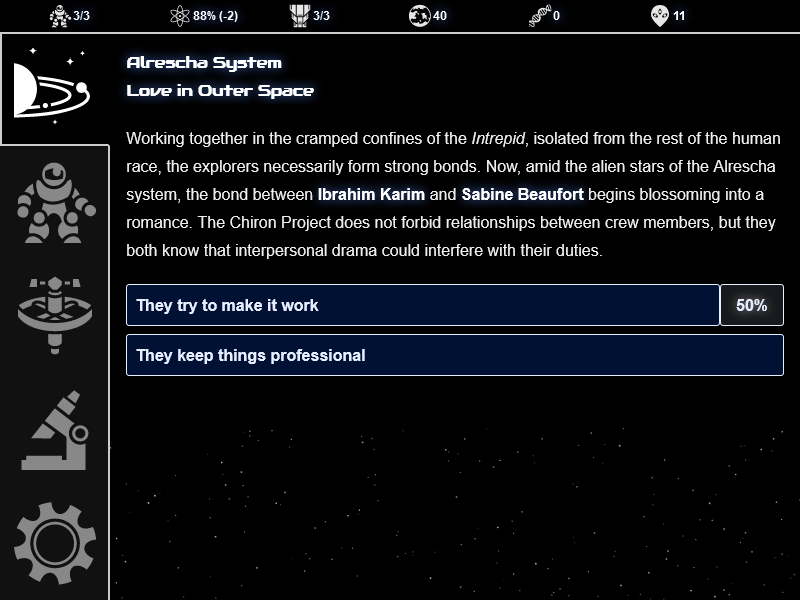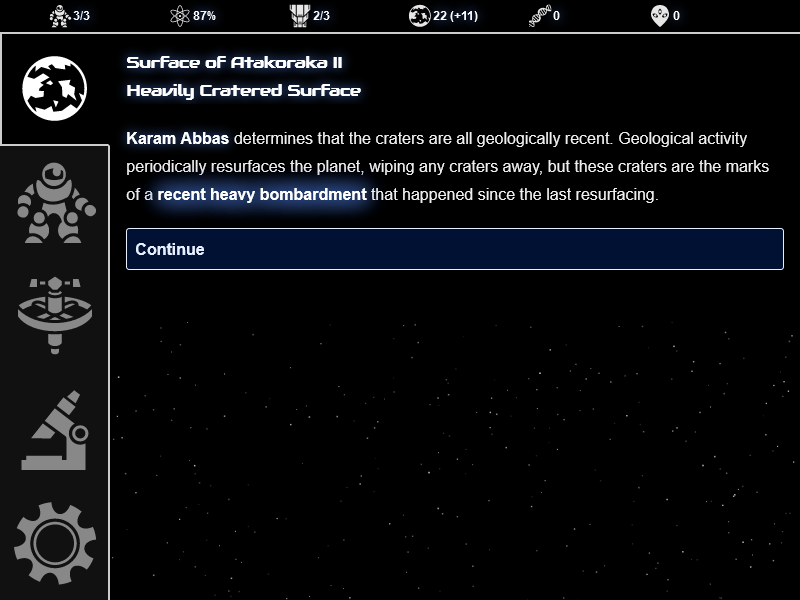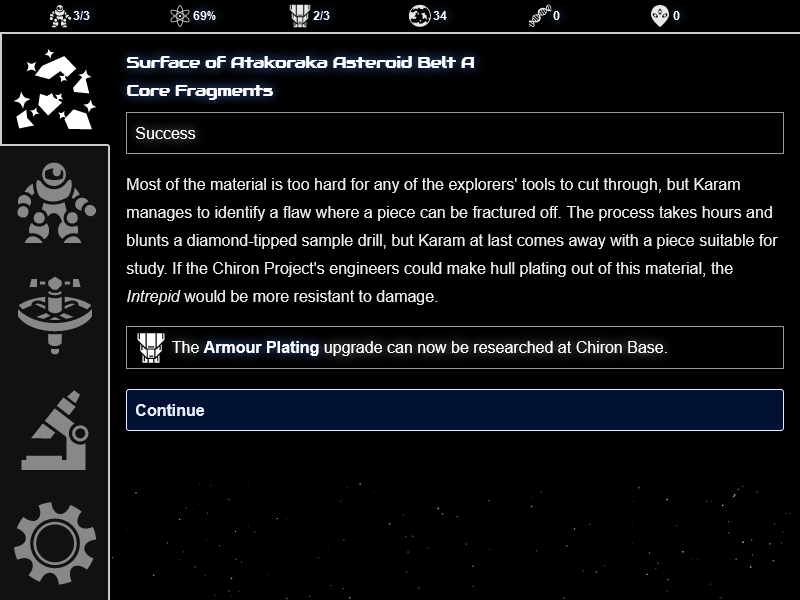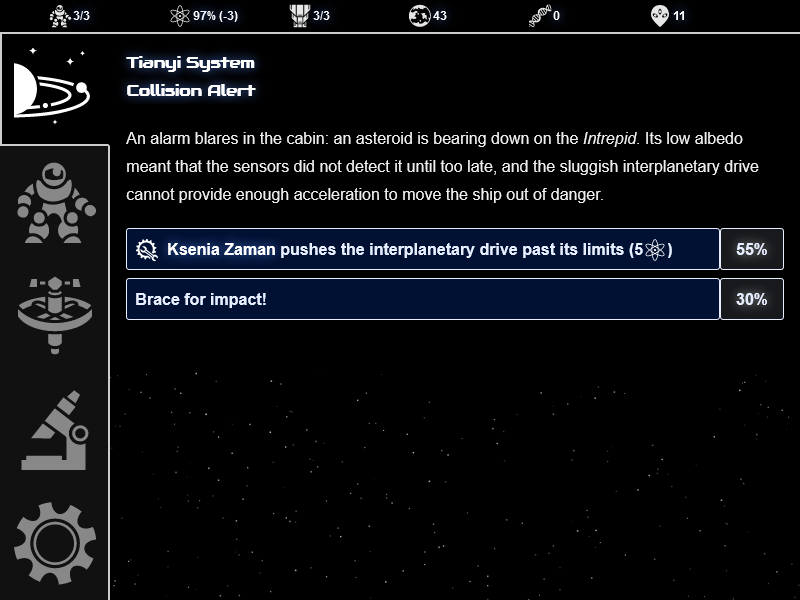
I think I can now say that Beyond the Chiron Gate is mostly finished. There’s still more content I’d like to add, but there are no obvious gaps where new content needs to be.
I can consistently play through the game without encountering any serious bugs. Lots of minor bugs, which I’ve mostly been fixing as I encounter them. I think the pace and difficulty of the game feel about right.
Some of the stuff I’ve added this month:
Events
I’ve added or significantly rewritten 15 events, mostly things that can happen during interplanetary or Gate travel.

The total number of random events in the game (not counting the special events that make up the intro and endgame, or that mark the first time you do certain things) is 117. This is the area where the game could benefit most from more content, so I’m going to add at least a few more before launch.
Discoverable traits
I’ve added a few more things to discover out in space. Planets can finally be covered in impact craters, which are usually due to meteor impacts but might be due to something else. I’ve added more content to do with space-dwelling life forms: when you discover one you can investigate it further to find out how a space-dwelling life form came to be.

The total number of possible discoveries in the game is 366. (Those are the secret traits that you need to explore something to find–counting non-secret traits, it’s closer to 500.)
Ship upgrades
I’ve split the scanners that detect life and civilisations into two, one for currently existing life/civs and one for extinct ones. Living ecosystems and civilisations are more interesting, but dead ones are more common, and being able to detect dead ones gives you more chances for getting the data you need at the end stage of the game.
I’ve also added three upgrades to increase the amount of damage your ship can take before it’s destroyed (one for each data type, paralleling the crew capacity upgrades). These don’t prevent your ship systems from being damaged, but they increase the number of systems that can be damaged before the game ends.

Total number of ship upgrades (not counting the “basic scanners” you start the game with) is 35.
Balancing and difficulty
I’ve decreased the amount of data you get from random events, to put it in line with the amount you get from discoveries. Also, the data gain bonus from having high-level scientist now applies to event data gain as well as discoveries. I’ve reduced the price of the more expensive ship upgrades (including the ones that unlock the endgame) because the total amount of data you’ll get in a game will be less.
These changes mean that the amount of data you get as the game progresses is steadier, rather than swingy based on which random event outcomes you get. These changes also incentivise the player to be more cautious in events, both because the rewards are less likely to be worth it and because losing a high-level scientist is worse. During my playthroughs I’m finding this to be a good change, because the previous optimal strategy was to always take the risk, whereas now the decision is more interesting.
I’ve also decreased the initial amount of damage the ship can take from 4 to 3, which can be increased up to 6 by the new armour upgrades. This makes the game more potentially deadly at the start, before you’ve got at least one armour upgrade, which I like. At the start of the game you’re worried about getting destroyed; towards the end of the game you’re worried about not getting enough data to unlock the ending before you run out of Gate trips.
A full playthrough of the game takes me 1-2 hours, and that’s with me skipping or skim-reading the text because I already know it.
Music system changes
I went in to fix a bug with the music system and ended up rewriting the whole thing. Previously, the game would switch between playlists when it needed to by fading one out and the other one in. Now, it’ll always play each track in full, and when a track ends, it’ll decide which playlist it should play next and play a track from that playlist. Playing each track in full makes the music smoother and less obtrusive, at the expense of being less immediately responsive (because it might be 3 minutes until the current track ends and the music changes).
There are 20 music tracks totalling 65 minutes, which I’ve divided into 4 playlists of 5 tracks each.
Other changes
Other changes include:
- If an explorer who’s Inspired would gain Depressed, they instead lose Inspired, and vice versa.
- You now have to click a confirm button before embarking with less than a full crew (thank you Pangolinasaur for the suggestion).
- Added more possible nicknames for interstellar civs. The nickname no longer includes the name of the system where you first encountered them.
- Landing events where you abandon the landing and return to orbit now block you from trying to land on the planet again.
- Fuel loss during events is highlighted in the event text. Options that will consume fuel now tell you so in the option text.
- Lots of bug fixes and interface improvements.

Final playtest and release plan
There’s still some more content I’d like to add (mostly new events) before I declare the game finished. I’m also going to spend more time fixing bugs and editing the in-game text, and I need to do the work of converting the game from a web page to a desktop app.
Once I’ve done that–probably at the end of March, or maybe sooner–I think I’m going to release the game to all patrons as a final playtest version. This will be your chance to give me suggestions for balancing changes and final things to add, and to help me find any bugs I’ve missed.
I’m still using 12 April as a launch date to aim for. I don’t know if I’ll hit it (and I’ll definitely miss it rather than launch a buggy game) but I’m fairly confident of launching in either April or May.
Thanks again for sticking with me through this long process, and I’ll see you next month!
